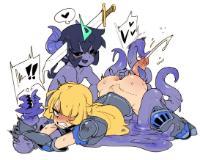Overview
About This Club
this club has fallen under new management, and is now facing a over haul...
i'll be aimming to turning the group into a typical dnd group where one can play dnd and dnd like games in a roleplay fashion, your sort of " theater of the mind" shit, or for a better word roleplaying dnd. though i aim to do stuff like avoid the use of stats and dice and instead somehow achive a similar system threw context and other such mechanics that don't narrow down to just numbers.
Type of Club
Roleplay Club
- What's new in this club
-
decided im gonna renovate the club again into a dungeon raider type of group... since the ttrpg club is kinda, well this... the concept being pretty straight forward. people would make their own dungeon's with their own traps, puzzles, monsters, rewards, rules and so on and then other people would challenge to try and complete them with either the dungeon maker or someone not raiding the dungeon acting as a gm for it... players would start with standard stuff and then kind of build their way up over the course of completing dungeons and such
-
SirenSoul joined the club
-
Hi Hi, Lets see where this will go
-
Cl4irdeLuna joined the club
-

Resources and mechanics
inkylore replied to inkylore's topic in DND Rule Lite: Contextual DnD's Limbo (OOC)
C o n t e x t u a l D N D Contextual dnd is about contextualizing the technical mechanics of dnd things like ability scores, skills and other stats not to mention feats and other abilites that rely on numbers. contextualizing them is often a game of persuasion. saying, wearing, doing (successfully) things that convey to the GM that yes, your character should be able to do these things. similar to how the gm decides on what the required dice roll is, they also decide if you've displayed enough infomation for them to judge if you can do whatever it is you seek to do. Take the ability score of strength for example. if you wanted contextulize it as being high, you might do things percieved as being strong. like wearing heavy armor and carrying a shield, have mentioned feats of strength mentioned in your backstory, carry a buster sword as a main weapon. manage to defeat monsters who also demonstrate feats of strength or gain a reputation for being particularly strong. on the other end the GM could bestow you with items or other things to further boost those same ability scores. though insstead of denoting that a item gives one a strength of +2, a Gm might dictate exactly how much stronger it makes one equipped to it. rather that means saying they're "this many times stronger" compare thier strength to another race or monster, or vaguely insinuate what one could do with this new strength as a comparison, or be as specific as to state how much lifting strength or physical force it grants, or alternatively grant them strength in a specific way. because of this their can be no exaggerations. if the GM says a glove gives you the strength to decimate a moutain with a single punch, then by the discription thats what it does. skills or skill checks like intemidation, animal handling and stealth are extensions of the main ability scores when contextualize. if insinuated by your normal abilitty scores then it should be implied that you possess skills of the same level if not greater. due to dnd often having professions and back grounds that allow a increase in those skills let alone if they possess profiency with them. a good example might be someone who's a rouge who might have good dexterity as a result they might also have a good slight of hand to the same degree, unless they have a background or other details that implies they may have had a great or greater slight of hand even before becoming an adventurer... Feats are typically features you get after a level up gaining you some sort of skill, ability or sometimes item or alternatively the improvement of said skill, ability or item, sometimes a small array of them per feat. contrary to normal dnd, you can't just point and click and tah-dah now you have it. you or more commonly the Gm should provide context on how you gained it. maybe you did a little training, found someone who taught it or gave it to you, that sort of thing. luckily most feats come with a introduction that explain what the feat is and how it might have been gained. some feats have limits or instruction as to how often they can be used or how they can be used, so you should probably keep that in mind. notable, rather then list it on your character sheet in order to remember due to the fact that you may or may not have the same build when paying diffrent games, i suggest instead to simple list it in a spoiler in the reply of the Game your player. particularly either editing the same spoiler when you need to update it or across several spoilers threw out the game to denote where and when you recieved new feats, skills abilities and alike. Levels are indicators of progress for a character, each level allowing them to grow in strength and class though other games might have diffrent perameters for how level works or how far it goes. for your typical dnd character you start at lv.1 ( unless stated otherwise by the GM) and can level all the way to lv.20, with some feats even caping the extent to which ability scores can be increased, but you probably already knew that. to contextualize Level you can simple narrate something that would mark they're progress of leveling up, preferable without refering to it directly as a level up. maybe they complete a quest or take a test that ranks them higher in a guild if they succed, maybe they were granted a magic item that grows and changes form whenever they level up. or maybe they have a master or guardian that makes themselves known to them, each time letting them know that they've improved a great deal, granting or teaching them they're choosen feats. something of that nature. of course you just as welcome to be unimaginative by having a voice in they're head tell them that they leveled up andd what comes with it, or to have it prompted with a engulfing light in the shape of a arrow pointing up accompanied by a corny lv up sound from a video game. Normally in dnd the 2 methods of leveling up is threw Milestones which means you level up after reaching a certain point in the game, which oddly enough is what most of the forementioned example work for. the other method is threw EXP. in short you gain points threw task usually bashing monster and level up once you gain enough points. contextualizing the variation is pretty easy, just make the "exp" a physical object the adventures have to collect and trade to something or someone to receive this level up. maybe gems to a guild or maybe a liquid inside a bottle that needs to be sacrificed to a goddess statue... of course the GM is welcome to take a less imaginative route to just counting the monsters defeated and quest done and go by that ( though i don't recommend it) either way its a resource someone will have to keep track of if you go this route. like normal dnd typically has an exact number for how much to gain the GM is welcome to use they're on numbers if they want. Advantages and Disadvantages, are a aspect that typically require a bit of creativity when being contextualized. normally in dnd you would just roll the dice twice and take the worst or better roll depending on the advantage. but with this the GM typically needs to come up with actual advantages or disadvantages and some times the player has to play into them. luckily most of the time its very obvious what they advantage or disadvantage is such as how wearing heavy armor gives you disadvantage with stealth because of how much it clanks or how having night vision gives you advantage on attacks in the dark with a room full of enemies. though some don't always seem straight forward to everyone. to which your welcome to come up with what exactly that advantage or disadvantage is, though you or the player might have to play into it such as making monsters seem weaker or slower then they would usually be or the player to the same principles. granted this doesn't mean your guaranteed to fail or succeed its just a matter of if the GM thinks you should be able too do it despite your temporary short coming or of course they could throw you a bone or make it happen for plot reasons as long as it seems reasonable. or rather as long as all parties don't make a fuse about it. Combat, this aspect might be hard to contextualize. in dnd combat is typically turn based with special and distance mechanics in mind. though you would typically take turns responding too how you would attack with the GM responding to if it succeeded or not and then the GM doing the same when it was a monsters turn. though that might become overly tedious. in my opinion its probably alot easier if you simple roleplay with T-1 Combat. i think everyone knows what that is, though i might explain it if i get enough people asking about it. now respectfully you should probably follow the lesser rules of combat such as not moving further then 30 feet per turn or takes 1 turn to get up after falling prone. though because different GM's may perform with various levels of detail some rules may not need to be followed if the information isn't made relevant. so if they GM makes no mention of distance between you and the monsters or says nothing about you falling prone you can honestly ignore it and treat it as a free pass. do note this is just a suggestion on how to do the combat system if you or your Gm has something else in mind on how to manage it i certainly won't stop you for going with it as long as it doesn't cause problems... "This concludes what i have on the process of contextualizing DnD mechanics, is something comes up in the future i may go over suggestions on how to contextualize those mechanics as well" -
i can get that... me im just trying to set up groups before blopping myself. maybe take a bit of a hiatus again
-
I kinda blipped off the site as a whole for a while due to irl shit hitting the irl fan.. im trying to catch up on rps but still not in the best spot atm
-
on a unrelated note what happened with that rp in the demon mansion club... you kinda blipped out
-
I mean, do what you want hun :3 i just want to make sure you knew what the title meant more than anything
-
a thread for generlized resources of the club or mechanics typically used to display how to contextualize dnd mechanics or the mechanics of other dnd like games, or more over enlisting other games so people can find and get familiar with how it to play it so they can better contextualize the mechanical aspects of the game... note that the contextualized explination often acts as a suggestion, and that if you know of a method for doing so without the use of stats or dice your welcome to do so.
-
ohhh, i mean what im actually trying to do is make it so that any dnd like game or can be converted into this rule light version as you put it. typically by playing them off purely context... not just solely dnd it's self.... but yea in that case what your suggesting probably makes more sense
-
theater of the mind is for when you play without mini's or a board, basically just using character sheets and dice to play the game well you rely on your imagination to picture the situation including combat your basically looking to do a version of it thats rules free/rules lite which is arguably similar but distinctly different, in that im assuming you want to avoid dice rolls entirely along with the numeric portion of the rules ...frankly it sounds like you want to do a medieval magic based powered by the apocalypse system but thats significantly different so its hard to go into any real detail in passing
-
oh i was pretty sure "theater of the mind" was when you basically forgo the mechnaical and technical stuff and just play of imagination and context alone.... i could compromise and add it into the title... would you be ok with that?
-
the clubs name, theater of the mind kinda... covers everything play by post does does by default on a site like this. I just thought I would suggest it
-
you mean the thread or the club it's self
-
their are no limits in the characters you can make however you are limited to using one post to place them all on... pretty simple really just place that wall of text in spoilers so you can neatly create a list of character or you know alternatively a list of variants of the same character for diffrent dnd game types. because of the nature of the club do reframe from mention of stats and statistical numbers or feats. but also because as im writing this i haven't quite yet worked out how these mechanics will operate without the use of stats and dice yet. for this thier is no sheet to copy past from, with so many game variations your bound to trip up so its best to just make your own around a particular dnd game/character sheet. though remember, no stats, statistical numbers, and of course unique items or skills that might mirror one's from the game.
-
might i suggest phrasing it as "DND rules lite" instead? i feel like that lines up with your intent a little more based on what im reading
-
still working on the kinks myself (no pun intended) so you might have to wait, but i appreaciate you joining anyway... kinda doing a bit of a rework in some area's
-
going to just grab a "join" to see where this goes
-
DreamsnThings joined the club
-
typical place to announce changes to the club
-
Flip_Flop_and_Sloppy joined the club
-
Little_Elvina joined the club
-
thread for chat, discussion, suggestion and so on out of character.
-
Newsletter





.thumb.jpg.407319bcb2dc76630e405f350cdca780.jpg)

